IJCRR - 13(11), June, 2021
Pages: 12-17
Date of Publication: 04-Jun-2021
Print Article
Download XML Download PDF
Occupational Stress and Job Performance Among Nurses in a Teaching Hospital, in South-South, Nigeria
Author: Regina Etita Ella, Augusta Eleazer Agharandu, Easter Osuchukwu, Patience Samson-Akpan
Category: Healthcare
Abstract:Introduction: Literature indicates that nurses' job performance in the health care system in Nigeria is deteriorating. Objective: To investigate the relationship between occupational stress and job performance among nurses in a tertiary institution in Nigeria. Methods: Descriptive (survey) design was adopted for the investigation. A purposive sampling technique was used to select two hundred and twenty-two (222) nurses from a population of 500. A reliable and valid occupational stress questionnaire constructed by the researchers was used in data collection. Questions were answered using simple percentages. Results: The results indicated that nurses experience occupational stress (91.0%); Identified stressors were workload (67.1%), inadequate motivation (64.9%), role conflict/ambiguity (54.5%) and poor working conditions (53.6%). Furthermore, it was revealed that occupational stress affected nurses' performance of some of their caring duties. Conclusion: Nurses 'job performance was influenced by the identified stressors. Government should train more nurses, deploy them to clinical settings to reduce workload; staff should be adequately motivated, roles and responsibilities be clearly defined and working conditions made conducive at all times.
Keywords: Nurses, occupational stress, Job Performance, Stressors, Teaching hospital, Stress indicators, Job performance indicators
Full Text:
INTRODUCTION
Job performance among nurses has been declining over the past years in the Nigerian health care industry. There is no denying that such poor job performance among nurses might be induced by Occupational stress (Job-related stress). The United Nations reasoned in this direction and thus labelled job-related stress as the 20th-century disease.1 The incidence of job-related stress in developing countries according is growing.2 Similarly, records show that job-related stress is a key factor in hampering job performance among nurses.3 Without overstating the obvious, nurses constitute a significant force in the health care delivery system. Given this knowledge they are exposed to rigorous training in various dimensions of patients’ care; such as physical caregivers, drug administrators, educators, counsellors, advocates, administrators, team players, not to say the least, in carrying out these, they are in recent times noted to be somehow poor in the discharge of these expected responsibilities. Could such observed poor performance to the causal factor of occupational stress?
The most common form of stress in various organizations today is known as occupational stress.4 Occupational stress is one of the most important workplace health risks for nurses in developing countries, therefore understanding its impact on nurses’ job performance will help stakeholders to develop appropriate strategies to reduce occupational stress. Occupational stress has been defined as any discomfort which is felt and seen at an individual level and triggered by instances, events or situations that are too intense and frequent to exceed one's coping capabilities.4 Occupational stress in this study is seen to be related to one's job and often stems from pressures that do not align with a person's knowledge, skills or expectations. In the health care setting, occupational stress claims to be negatively allied to job performance.5 Job performance is fulfilling assigned roles and responsibilities effectively. Nursing job performance reflects the quality of care delivered and consequently patient outcomes, therefore, poor job performance is considered a risk factor for patients’ safety. Ensuring good job performance of nurses is one key component for the provision of quality nursing care.
Various studies have linked occupational stress with job satisfaction.2,6,7 Only a few studies have considered occupational stress about nurses’ job performance. Stress whether from whatever source can have both positive and negative effects on a worker’s job performance.6,8 Mild stress enhances performance when under pressure, acts as a motivator and helps to ensure safety when there are threats. Nevertheless, when there is devastating stress, it becomes damaging to individual mood and relationships resulting in numerous somatic and psychological health challenges culminating in poor job performance.9
Nurses respond to occupational stress differently, some manifesting disorders such as ulcer, hypertension, stroke, heart attack, headache and cancer (physical response).10,11 Others may manifest emotional exhaustion, absenteeism, anxiety, frustrations, anger and feelings of inadequacy, helplessness/powerlessness, and feeling of leaving the job. All these responses may culminate in poor job performance. It is expedient therefore that, occupational stressors in the nursing work environment, their level of influence on nurses’ job performance be identified and possible remedies proffered.
Some studies in Nigeria revealed that nurses experience occupational stress which could harm their job performance.12,13 Most studies have demonstrated workload, long working hours to be the most frequent stressors.8,11,14,15 A study on Stress and Coping Strategies among Undergraduates in a Tertiary Institution in Nigeria also revealed that workload contributed to stress during the clinical experience.6 Participants stated that their workload usually increased between eight to 14 hours due to pressure from both inpatients and outpatients, but more especially for in-patients who usually need more attention; to have to their beds made, be given bed bath, have their drugs/injections served, have their wounds dressed; all these activities, according to the respondents are carried out after participation in ward rounds, most often with only 2-3 nurses on duty to attend to 20-30 in-patients.
A significant relationship between inadequate staffing and occupational stress was reported.12,15
Inadequate staffing referred to having one qualified and experienced nurse on duty with 3-4 qualified but inexperienced nurses who may not be conversant with some complicated procedures. Role conflict and role ambiguity were also identified as stressors.8,13 The findings showed that 49% of nurses reported conflict with the doctors, 52% reported role ambiguity and conflict with supervisors and 53% conflict with peers.13 Conflicting multiple role demands contributed to the development of occupational stress.8 Similarly, a cross-sectional study observed role conflict and role ambiguity, especially when asked to represent their boss/colleague in an unfamiliar ward or environment.16 Respondents further stated that hard work was poorly rewarded, and that poor/lack of special incentive for them was a source of occupational stress. Studies have reported on the effect of occupational stress on workers in general and nurses in particular, resulting in poor performance of specific nursing duties.1,12,15,16 Another study reported effects such as nurses being prone to error in their clinical decision making and practices.1 A study in 3 private health care facilities in Accra, Ghana revealed a reduction in the productivity of 213 nurses, 95 (44.6%) of the nurses reported errors and wrong decisions in their performance.17
Stress among employees does enhance their job performance in a positive manner.4 The study reported a significant positive relationship between employee stress and job performance (r = 0.348, P=0.0001). The findings suggest that as workers stress rises, their work performance is also likely to rise and vice versa. This assertion concludes on the premise that stress to an extent enhances job performance. This finding to some extent is in agreement with.18 The author asserted that an inverted u-type curve is used to depict the effect of stress on employee performance. Therefore, as stress rises, the performance of workers also rises.18
Nurses are pillars of any health care system; hence it is important that factors that cause occupational stress and trigger poor job performance be identified and be judiciously attended to. Given that stressors differ with different settings, there is a need to explore them from the perspective of a tertiary institution.
Therefore, this study seeks to:
-
Explore if Nurses in a Tertiary health institution in Port-Harcourt experience occupational stress?
-
Identify what factors are responsible for occupational stress among nurses in a tertiary health institution in Port-Harcourt.
-
Assess if occupational stress has any effects on the job performance of nurses in a tertiary health institution in Port-Harcourt.
MATERIALS AND METHODS
A descriptive research approach was used to investigate the influence of nurses’ occupational stress on their job performances in a tertiary institution in South-South, Nigeria. The institution is a teaching hospital founded in 1980; located in the suburban city of Port Harcourt. It is saddled with the responsibility of teaching, clinical services and research. The hospital has 32 wards/units with a total of five hundred (500) nurses made up the target population. This constituted all nurses who were employed and were working at this hospital at the time of this study, as was obtained from the records department of the institution. 14 wards were randomly selected from the 32 wards. Accessible population constituted of all nurses on duty at each of the selected wards at the time of administration of the instrument. A sample of two hundred and twenty-two (222) was purposively selected from the accessible population. Only those: present at the time of data collection, who had spent 5years and above at this institution, who were nursing officers 1 and above, and who were willing to participate in the study met the inclusion criteria. Thus, participation was voluntary.
Statistical analysis
A self-administered questionnaire with a content validity index of 0.79 and a test-retest reliability coefficient of 0.81 was administered to the participants. Section C was constructed using a three (3) point scale with the options: HE (high extent), ME (moderate extent), LE (low extent). Section D on the other hand consisted of items with response options on the extent to which stress have affected or limited the performance of functions of nurses. The response options were also (HE, ME, and LE). Data were analysed using simple percentages
RESULTS
Socio-demographic variables
Sixty-three respondents (28.4%) were below 30years of age, 75(33.8%) were between 31-44years and 72(32.4%) were 45years and above. Two hundred and nineteen respondents(98.7%) were females, only three (1.3%) were males. The majority of the respondents (72.1%) had attained Nursing certificates while 27.9%had attained degree certificate in Nursing. Data for other socio-demographic variables are provided in Table 1.
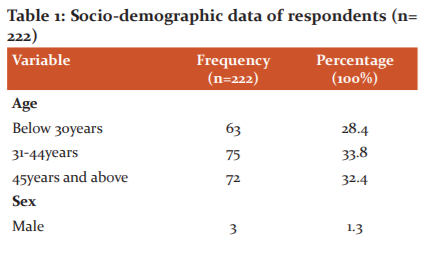
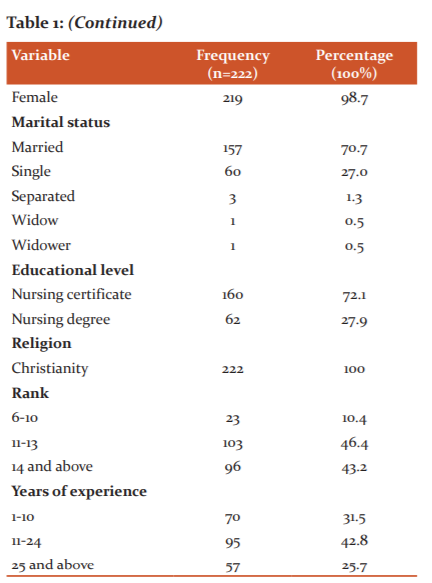
Responses to research questions
Research question 1
Explored if Nurses in a Tertiary health institution in Port-Harcourt experience occupational stress. Data were collected using five items (1-5) in section B of the research instrument. The analysis of the data is as summarized in Table 2
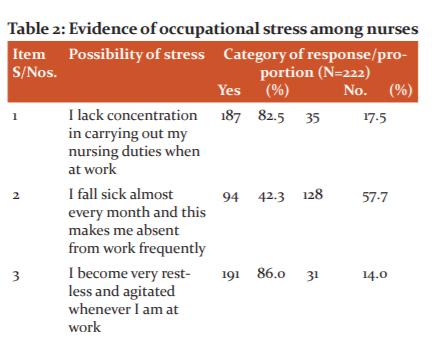
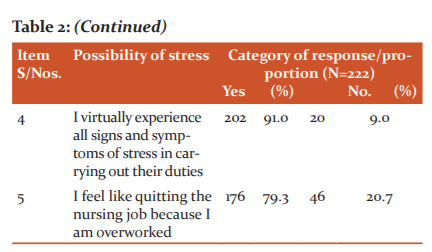
The responses in Table 2 show that 202 of the respondents equivalent to 91 per cent virtually experience all signs and symptoms of stress in carrying out their duties, 191 (86.0%) asserted that they become very restless and agitated when at work. 187 of the respondents (82.5%) opined they lack concentration in carrying out their nursing duties when at work, while 176 respondents (79.3%) maintained that they feel like quitting the nursing job because they are overworked 94 (42.3 per cent) respondents said they fall sick almost every month and this makes me absent from work frequently.
Given the number of items generated on this sub-scale of the instrument (the measure of the possibility of stress), and the cumulative responses of the sampled nurses to these items, 76.58 per cent are noted to have occupational stress. Being that this is significantly above the average of 50 per cent, it can therefore be concluded that the extent of occupational stress among nurses in this institution is significantly high.
Research question 2
This explored factors responsible for occupational stress among nurses. Data were generated using section C of the instrument. Five major factors listed were displayed for respondents to indicate the extent to which such stressors affect their performances. The summary of the responses obtained is as shown in Table 3.
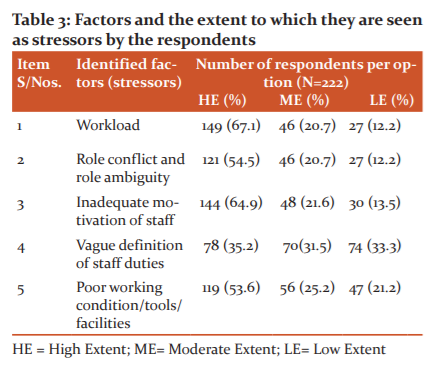
Workload, inadequate motivation, role conflict/ambiguity and poor working condition (tools, facilitates) respectively. Each of these contributes 67.1 per cent, 64.9 per cent, 54.5 per cent and 53.6 per cent measure as stressors respectively to the respondents. The vague definition of staff duties though a stressor on the other hand did not seem to pose significant stress to the nurses. Only 78 nurses (35.2%) see stress from this factor to be of high extent, 70 nurses (31.5%) and 74 nurses (33.3%) see stress from this factor to be of moderate extent, low extent respectively. It is therefore obvious that the major factors responsible for the development of stress among nurses in this tertiary institution are workload, inadequate staff motivation, role conflict and role ambiguity, and poor working condition/poor tools and or poor facilities.
Research question 3
This is exploring the effects of occupational stressors on nurses’ job performance. The responses in Table 4 reveal the extent to which stressors exerts influence on nurses’ job performance across some performance indicators of interest in this study. From the results, most of the respondents indicated that occupational stressors influenced their job performance to a large extent.
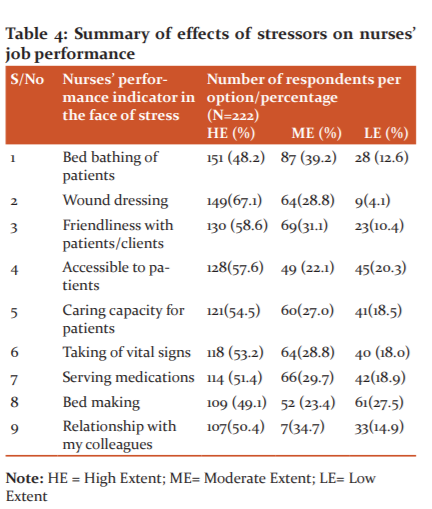
DISCUSSION
The findings of this study confirmed the presence of occupational stress among nurses, and lend credence to the findings of other studies.1,8,11,12 From the results workload and poor staff motivation ranked highest, followed by role conflict/ambiguity, poor working conditions, and poor working conditions/tools as factors and extent to which they exert as stressors; except for the vague definition of staff duties. This finding corroborates that workload, lack of motivation and role conflict were factors that contributed to occupational stress.1,8 However, sources of occupational stress among nurses may vary among regions, countries, organizations, departments, nursing specialists and individuals. Implying that workload as a source of stress among nurses in this tertiary institution may not be a source of stress in another setting. The difference could be attributed to participants and the setting which in this study are nurses in a hospital setting against participants in a company setting that does not deal with sickness and human lives.
The analysis of objective three revealed that stress exerts a high effect on nurses ‘job performance. Nurses carry out several tasks in the discharge of their duties, it is worth noting that stress exerts a substantial effect on the extent to which nurses carry out such duties. As noted in this study, stress varies among nurses in the extent to which it affects their performances in various areas. From nine performance indicators listed, it is observed that stress impacts to a high extent the delivery of nursing services such as bed bathing of patients (68%), followed by wound dressing (67.1%0, then lifting of patients (57.6%), caring for patients (54.5%), taking of vital signs (53.2%), serving medication (51.4%), supervision of juniors (50.4%), bed making (49.1%) and carrying out of duty allocation (48.2%) respectively. The finding agrees that occupational stress tends to be negatively allied to job performance.5,13 In addition, occupational stress affects nurses’ job performance negatively and interferes with (productivity) quality nursing care.18
Contrarily, other results showed that stress among employees does enhance their job performance in a positive manner.10 Their finding showed a significant positive relationship between employee stress and job performance (r = 0.348, sig. value=.000).10 This indicates that as employee stress increases; their job performance also tends to increase and so on. This indicates that as employee stress increases, their job performance also tends to increase and vice versa. This assertion concludes on the premise that stress to an extent enhances job performance in an organization. This finding to some extent is in agreement with.6Theauthor’s findings showed that an inverted u-type curve is used to depict the effect of stress on employee performance. Thus, as stress increases, the performance of employees also increases.6 However, went further to state that when stress becomes excessive, then the performance of employees also begins to decline. His finding invariably is in agreement that excessive stress is very harmful and detrimental to the employee well-being and their overall performance. This reversibly agrees with the findings of this study. However, the difference in the findings of this study and that of the previous study 10could be attributed to the different type of workers and setting. While the latter study dealt with company and company workers, whose job description may permit shifting/workload to a later time or date perceived as more convenient, this study’s participants are nurses who deal with lives of patients and may be on their toes to restore life before closing or as the need arises.
This study is limited to Port Harcourt, an urban setting and did not extend to other urban or rural areas. This may limit the generalizability of the findings across other settings.
CONCLUSION
Occupational stress as a common factor impacts negatively on nurses as they carry out their duties in health institutions. It is therefore expedient to identify occupational stressors and plan nursing activities to reduce stress. The study, however, concludes that there is a negative influence of occupational stressors which include work overload, lack of incentives, inability to manage multiple roles/lack of clearly defined roles, unconducive work environments on nurses’ job performance. It is recommended that Workplace policies that promote nurses’ autonomy reduce conflicting situations, the reward for hard work or more incentives and exemplary leadership/supervision is advocated. Implementation of the above recommendations will increase nurse’s productivity, and quality nursing care.
CONFLICT OF INTEREST: We hereby declare that there is no conflict of interest in this paper
AUTHOR CONTRIBUTION: Regina Etita Ella (REE) conceived the idea and designed this study and edited the manuscript. Augusta Agharandu and Easter organized for ethical approval and data collection of the study. Professor Samson–Akpan took the lead in data analysis, involving all the authors. All the authors revised and proofread the final manuscript before submission for publication.
FUNDING: This research was conducted and funded by the personal contributions of the four authors. No external funding obtained.
ETHICAL APPROVAL: Ethical approval was received from UPTH research Committee with approval number UPTH/ADM/90/S11/VOL X1/376. Consent was also received from the participants.
ACKNOWLEDGEMENT: We are grateful to the University of Port Harcourt Teaching Hospital for giving us the ethical clearance to carry out the research. We also deeply appreciate all the Nurses of the hospital who participated in the study. We thank the Director of Nursing for her supporting role. We appreciate those who assisted in data collection for their invaluable contributions. Thank you all because without permission from UPTH and the willingness of Nurses to participate in this research will not have been possible.
References:
-
Onasoga OA, Osamudiamen OS, Ojo AA. Occupational stress management among nurses in selected hospital in Benin City, Edo state, Nigeria. Eur J Exp Biol. 2013;3 (1):473-81.
-
Faremi FA, Olatubi MI, Adeniyi KG, Salau OR. Assessment of occupational related stress among nurses in two selected hospitals in a city southwestern Nigeria. Int J Africa Nurs Sci. 2019;10:68-73.
-
Didehvar M, Zareban I, Jalili Z, Bakhshani NM, Shahrakipoor M, Balouchi A. The effect of stress management training through PRECEDE-PROCEED model on occupational stress among nurses and midwives at Iran hospital, Iranshahr. J Clin Diagn Res. 2016;10(10):LC01.
-
Amoako EP, Gyamfi OA, Emmanuel AK, David B. The effect of occupational stress on job performance at Aspet A. Company limited. Global J Arts Humanit Soc Sci. 2017;5(8):1-17.
-
Sharma P, Davey A, Davey S, Shukla A, Shrivastava K, Bansal R. Occupational stress among staff nurses: Controlling the health risk. Indian J Occup Environ Med. 2014;18(2):52.
-
Samson-Akpan PE, John ME, Edet OB, Ella RE. Stress and coping strategies among undergraduate nursing students in Calabar, Nigeria. J Nurs Health Sci. 2017;6(3):61-70.
-
Sahraian A, Davidi F, Bazrafshan A, Javadpour A. Occupational Stress among Hospital Nurses: Comparison of Internal, Surgical, and Psychiatric Wards. Int J Commun Based Nurs Midwif. 2013;1(4):182-90.
-
Ella RE, Asuquo E, Akpan-Idiok P, Ijabula IJ. Impact of job stress on nurses’ job satisfaction in a public hospital, Cross River State, Calabar, Nigeria. Int J Humanit Soc Sci Educ. 2016;3(9):57.
-
Help Guide, Stress causes and effect: tips for workplace stress reduction. 2016;
Available from http://www.helpguide.org/mental/work_stress_management.htm
-
Faraji A, Karimi M, Azizi SM, Janatolmakan M, Khatony A. Occupational stress and its related demographic factors among Iranian CCU nurses: a cross-sectional study. BMC Res Notes. 2019;12(1):634.
-
Ladan MA, Khalid DS, Musa HA, Ogbeh M, Muhammad FL. Occupational stress among health professionals in Ahmadu Bello University Teaching Hospital (ABUTH), Shika, Zaria, Nigeria. West Afr J Nurs. 2014;25(1).24-36.
-
Armon MA, Lukpata FE, Abang V. Determinants of Nurses Job Stress in Critical Care Environment. A Case Study of Nurses in University of Calabar Teaching Hospital, Calabar, Cross River State, Nigeria. Int Profess Nursing J 2012;10(2), 66-72.
-
Mohite N, Shinde M, Gulavani A. Occupational stress among nurses working at Selected Tertiary Care Hospitals. Int J Sci Res. 2014; 3(6):999-1005.
-
Pretrsovan I, Pokhilenko I. Job satisfaction of Nursing Managers: Literature Review. Bachelors Thesis degree programme in Nursing, Social services, Health and Sports. 2015; JAMK University of Applied Sciences. http://citeseerx.ist.psu.edu/viewdoc/download?doi=10.1.1.1026.1535
-
Edoho SA, Bamidele EO, Neji OI, Frank AE. Job Satisfaction among Nurses in Public Hospitals in Calabar, Cross River State Nigeria. Am J Nurs. 2015;4(4):231-237.
-
Nabirye RC, Brown KC, Pryor ER, Maples EH. Occupational stress, job satisfaction and job performance among hospital nurses in Kampala, Uganda. J Nurs Manag. 2011 Sep;19(6):760-8.
-
Shinde M, Anjum S. A textbook of Nursing Management. Sneha publication India (Dombivili). 2012
-
Blumenthal I. Services SETA. InEmployee assistance conference programme. 2003;Vol.2(2):pp. 5-21.
|






 This work is licensed under a Creative Commons Attribution-NonCommercial 4.0 International License
This work is licensed under a Creative Commons Attribution-NonCommercial 4.0 International License